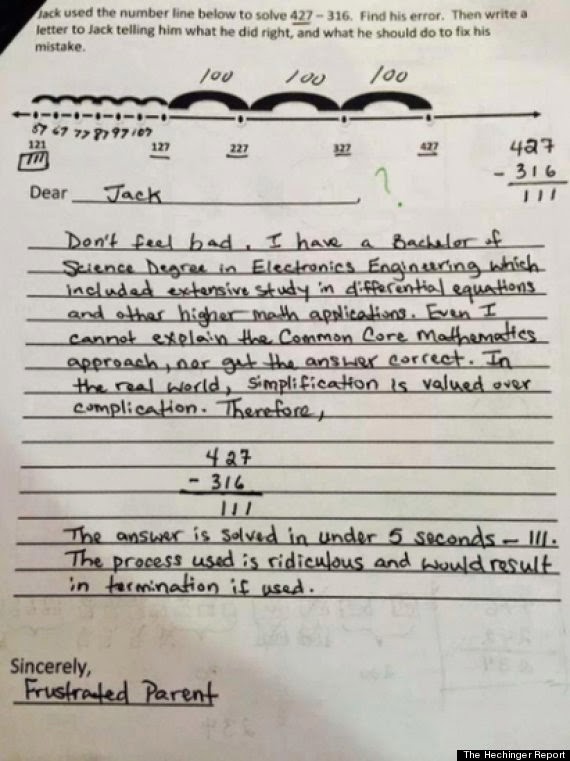 |
| http://www.huffingtonpost.com/2014/03/28/viral-common-core-homework_n_5049829.html |
As the common-core aligned homework above seems to overly confuse a far simpler problem, I sometimes feel similarly when I consider some of the new comment codes for report cards.
We received a radically new set of report-card comment codes this year. I imagine we are trying to meet the requirements of our RttT
For many years, we had about fifty comment codes for report cards, including some in Spanish. I kept my copy of codes in a protective plastic cover to save it from the wear and tear of repeated usage. Back then, we physically bubbled in perforated sheets. For several years now, we have submitted marking-period grades electronically.
This year, we received a new set of comment codes, many pages in length. As I'm sure I will not laminate all those pages, it's nice that the codes are attached electronically to our grading spreadsheets. Some of the comments enjoy very high #s. As a historian, some are easier to remember than others, like 1066 ("Does not complete homework assignments"). In the name of convenience, I made my own cheat sheet with the several comments I will need the most for students who are not making the grade: missing homework, excessive absence, lateness, low test grades.
Two of my favorite comments are missing. I used to enjoy comment 14: "Has ability to do better." I and my colleagues also lamented the loss of old comment code 34: "Has cut class," a most important messages to send home on paper. Now, as it appears, we can only remark on absence--which a parent might mistake for a few legitimate days of illness. Of course, there are other ways to reach parents, but I like to reinforce all of that on the report card, given the importance of the document itself.
There are so many comments now that one feels, at times, like one is looking for a needle in a haystack. Some of the comments seem gratuitously convoluted. Let me give you some real examples:
Comment Code 1607 (coincidentally, the year Jamestown, Virginia, was founded): "Meets standards in evaluating reasoning in important US texts, including application of constitutional principles and use of legal reasoning."
Comment Code 1611 (coincidentally, the first year of publication for the King James Bible): "Meets standards in analyzing foundational US documents for themes, purposes, and rhetorical features." (My spell check doesn't even accept the word "foundational"!)
I pity the poor foreign-born parent trying to make heads or tails of these comments or the Mom and Dad coming home from a hard day at the office to confront this stuff.
In the spirit of great Common-Core aligned comments, I have decided to propose a few of my own:
Comment Code 13,897: "Exceeds effectiveness in a full range of collaborative discussions (one-on-one, in larger groups, and teacher-led) with diverse partners on post-graduate-level topics and texts, utilizing arcane, Common-Core based mumbo jumbo to superficially appear to reach a standard of erudition beyond the grasp of mere plebeians."
Comment Code 17,201: "Approaching standards in yielding reams of data based on personal socioeconomic factors for future databases, subject to environmentally hazardous mining practices by capitalist vendors, and cyber thieves, for purposes not yet entirely grasped."
Comment Code 21,918: "Meets standards for enjoying seat time in a course entitled "Related Arts" which serves as a front for more test prep so as to aid the school in approximating more closely a full range of standards which may ultimately be unattainable by many who speak little English, at the cost of their teachers' jobs."
Comment Code 28,567: "Far below standards in suffering patiently through six days of extended testing without exhibiting signs of severe psychological distress, resulting in physical symptoms."
If I could make a report card for the Common-Core reformers, I am sure it would not be very flattering. I might use the following old-time comments:
17: "Generally non-cooperative"
18: "A distractive influence in class"
Then, I'd offer some encouragement:
12 "Shows a great deal of effort"
14 "Has ability to do better"
But, ultimately, I'd have to end with every student's worst nightmare:
35: "Call for appointment"
No comments:
Post a Comment